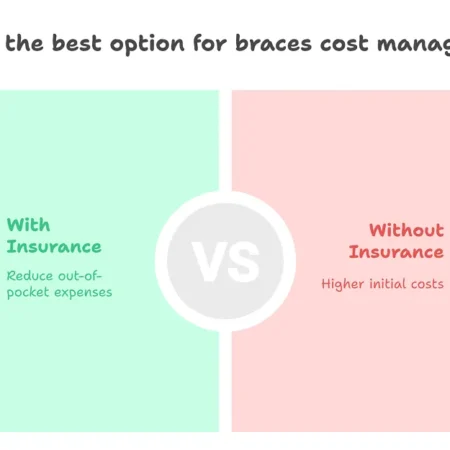When it comes to achieving a perfect smile, many people wonder about the compatibility of braces with dental implants and crowns. This guide will help you navigate the intricacies of Orthodontic treatment options available to you if you have already undergone dental work such as implant placement or received a crown. Let’s explore how braces can fit into your dental care plan.
How do Braces and Dental Implants Work Together?
Braces and dental implants can work harmoniously in orthodontic treatment. An implant serves as an anchor point, allowing braces to effectively straighten your teeth and correct alignment.
When a dental implant is placed, it can stabilize the surrounding teeth, making it possible to move the teeth around the implant, thus achieving a balanced smile with braces. This synergy is essential in ensuring optimal dental health and aesthetics.
What Role Does a Dental Implant Play in Orthodontic Treatment?
A dental implant plays a crucial role in orthodontic treatment by providing a solid foundation for braces. The titanium post, which replaces missing teeth, can act as an anchor point for the braces, enabling the orthodontist to strategically move the surrounding teeth.
This integration ensures that the rest of your teeth align beautifully while maintaining the integrity of the dental implants and braces.
Is it Possible to Get Braces with Dental Implants Already in Place?
Yes, it is possible to get braces with dental implants already in place. Many patients successfully navigate this path by incorporating braces into their treatment plan.
Whether you choose traditional metal braces or Invisalign, your orthodontist can tailor your approach to accommodate your dental implants and ensure the desired outcome is achieved without compromising the integrity of the implant.
What are the Considerations for Braces with a Dental Crown?

When considering braces with a dental crown, several factors come into play. The crown, which covers a damaged or decayed tooth, may affect how braces interact with adjacent teeth, especially when considering treatment with braces.
Your orthodontist will evaluate the dental work involved and determine the best approach for your treatment plan, ensuring that the braces can still help in straightening your teeth without compromising the crown.
Can Braces Move the Teeth Around a Dental Crown?
Braces can indeed move the teeth around a dental crown, but it requires careful planning, especially when considering braces with a dental implant. The orthodontist must assess the crown’s stability and its relationship with surrounding teeth, especially when planning for braces before dental implants.
In many cases, braces may be adjusted to ensure that they can effectively straighten your teeth while considering the crown’s position, ensuring consistent progress throughout your orthodontic treatment.
How Does Having a Crown Affect Your Orthodontic Treatment Plan?
Having a crown influences your orthodontic treatment plan by necessitating a tailored approach. The orthodontist will examine how the crown interacts with your natural teeth and plan accordingly.
This could involve adjusting the braces mechanics to ensure that movement is optimized without damaging the crown, allowing you to achieve a straight smile while maintaining your dental integrity.
Should You Get Braces Before a Dental Implant?
Why is Implant Placement Considered After Orthodontic Treatment?
Implant placement is often considered after orthodontic treatment, or braces first, to ensure that the alignment of your natural teeth is optimal before the surgical procedure.
By straightening your teeth first, your orthodontist can create the necessary space for the dental implant to serve as an effective anchor point. This sequence not only enhances the aesthetics of your smile but also contributes to the proper function of your dental work, leading to better long-term results.
How Do Braces Help Before Getting Dental Implants?
Braces can play a pivotal role in preparing your mouth for dental implants by aligning your natural teeth properly. When braces are used prior to implant placement, they can adjust the positioning of your teeth around the implant site, ensuring that the surrounding teeth are in the correct orientation.
This orthodontic treatment not only facilitates optimal implant placement but also enhances the overall dental care by ensuring a balanced bite and smile through braces can help.
What are the Alternatives to Braces if You Have Dental Implants?

Are Options Like Invisalign Suitable with Dental Implants?
Invisalign can be a suitable alternative to traditional braces for patients with dental implants. This clear aligner system allows for gentle movement of your teeth, accommodating any dental work without the bulk of metal braces, making it an excellent option for braces before dental implants.
Your orthodontist will evaluate your specific case to determine if Invisalign can effectively straighten your teeth while considering the presence of dental implants, ensuring a customized treatment plan that aligns with your dental goals.
Can Traditional Metal Braces Be Used with Implants?
Yes, traditional metal braces can be used with dental implants, providing a reliable method for tooth alignment. The braces can work around the implant, allowing your orthodontist to move the teeth around the implant effectively.
However, it’s crucial to assess the position and stability of the implant first, as this will influence the overall treatment plan and the mechanics of the braces, ensuring your orthodontic treatment is both effective and safe.
How Does Missing Teeth Affect Orthodontic Treatment?
Can Braces Help with Missing Teeth Before Implant Placement?
Braces can indeed help manage missing teeth before implant placement by aligning the remaining teeth and creating space for future dental work, particularly around the implant to create a more stable foundation.
Correctly positioning the surrounding teeth can make it easier to insert dental implants at a later date. This proactive approach not only improves the overall appearance of your smile but also aids in achieving a functional bite, enhancing your dental health and treatment outcome.
Is it Essential to Replace Missing Teeth Before Getting Braces?
While it is not always essential to replace missing teeth before getting braces, doing so can greatly benefit your orthodontic treatment.
If you experience Teeth Feeling Loose with Braces, don’t worry—it’s a common part of the process. When gaps left by missing teeth are addressed, it helps create a more stable foundation for braces to work effectively. However, your orthodontist will assess your unique situation and determine the best course of action to ensure your treatment plan aligns with your dental health goals and desired smile.






No Comment! Be the first one.